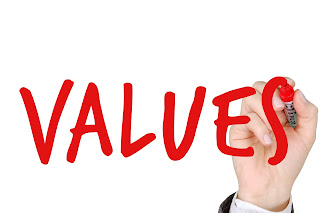Within institutions there is much talk of values. Companies publish values statements. Churches promote values directly derived from religious texts. And schools construct short definitions of acceptable behavior, which collectively sit under the heading: School Values. But what exactly are these "values"? What is the purpose of a values statement within an organization?
All societies have laws, many of which we accept as necessary for social cohesion. Occasionally one of those laws is found to be outdated and is modified. Values, on the other hand, seem to sit at a different level. They may be used, perhaps, to generate laws. But they, themselves, are designed to be fixed and unchanging. For example, the Catholic value of the "Sancitiy of Life" will never be abandoned. And it sits at the center of some of our laws. We may not be religious, but we can still accept the value that human life ought to be preserved. Over time, laws are adjusted to suit society's better understanding of itself and what counts as "human life", while still maintaining that life is of the highest value.
Are corporate values the same type of thing? When we see company values listed as: Innovation, The Best People, Customer Commitment, or Personal Accountability, we may find ourselves questioning whether these are universal values or merely opinions about what is good in a certain context. In this way, company values seem to be more like rules that the company values, rather than being values in themselves. If this is true, it is possible that company values may be contrary to true human values - whatever these may be.
We must be careful, therefore, in accepting values statements without analysis. We should ask ourselves where the values came from; what assumptions underpin them; what outcomes they are being used to promote. We may find that some values are not as valuable as they initially sound.
